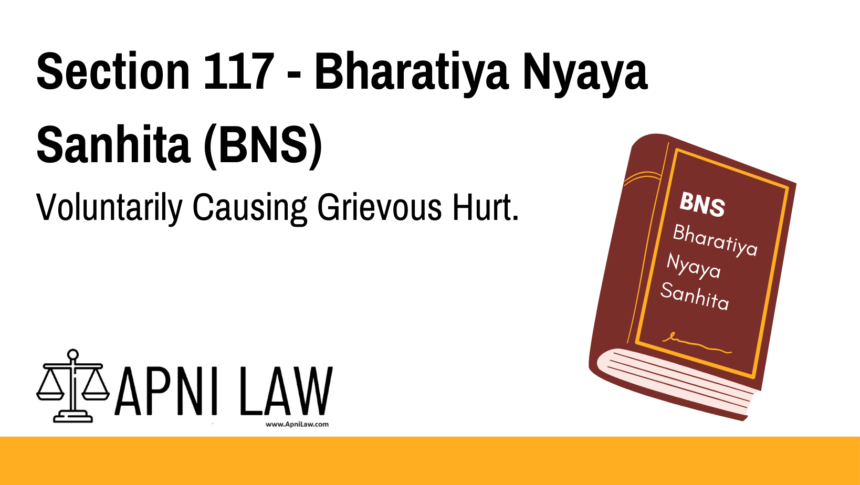Code: Section 117 BNS
(1) Whoever voluntarily causes hurt, if the hurt which he intends to cause or
knows himself to be likely to cause is grievous hurt, and if the hurt which he causes is
grievous hurt, is said “voluntarily to cause grievous hurt”.
Explanation.—A person is not said voluntarily to cause grievous hurt except when he
both causes grievous hurt and intends or knows himself to be likely to cause grievous hurt.
But he is said voluntarily to cause grievous hurt, if intending or knowing himself to be likely
to cause grievous hurt of one kind, he actually causes grievous hurt of another kind.
Illustration.
A, intending of knowing himself to be likely permanently to disfigure Z’s face, gives
Z a blow which does not permanently disfigure Z’s face, but which causes Z to suffer severe
bodily pain for the space of fifteen days. A has voluntarily caused grievous hurt.
(2) Whoever, except in the case provided for by sub-section (2) of section 122, voluntarily
causes grievous hurt, shall be punished with imprisonment of either description for a term
which may extend to seven years, and shall also be liable to fine.
(3) Whoever commits an offence under sub-section (1) and in the course of such
commission causes any hurt to a person which causes that person to be in permanent
disability or in persistent vegetative state, shall be punished with rigorous imprisonment for
a term which shall not be less than ten years but which may extend to imprisonment for life,
which shall mean imprisonment for the remainder of that person’s natural life.
(4) When a group of five or more persons acting in concert, causes grievous hurt to a
person on the ground of his race, caste or community, sex, place of birth, language, personal
belief or any other similar ground, each member of such group shall be guilty of the offence
of causing grievous hurt, and shall be punished with imprisonment of either description for
a term which may extend to seven years, and shall also be liable to fine.
Explanation of Section 117 BNS
Key Elements of the Offense
- Voluntary Intent: The accused must have either intended to cause grievous hurt or known that their actions were likely to cause grievous hurt.
- Actual Infliction of Grievous Hurt: The injury must be grievous in nature as defined under Section 116 BNS.
- Special Provisions:
- Sub-section (3): If the victim is permanently disabled or in a vegetative state, the punishment is 10 years to life imprisonment.
- Sub-section (4): If five or more persons commit this offense based on discrimination, they face up to 7 years of imprisonment.
Illustrations
Example 1: Fracture with Intent
A intentionally hits B with a hammer, causing B’s leg to fracture.
Since a fracture is grievous hurt (Section 116 BNS), and A acted voluntarily, A is guilty under Section 117 BNS.
Example 2: Permanent Disability
C violently attacks D, causing severe head trauma that results in D being in a coma (persistent vegetative state).
C will be punished under Section 117(3) BNS, facing at least 10 years to life imprisonment.
Example 3: Caste-Based Assault
A group of six individuals beats up E because of his caste, breaking his ribs and causing a fracture.
Since five or more individuals acted based on caste, they are each guilty under Section 117(4) BNS and face up to seven years of imprisonment.
Common Questions and Answers on Section 117 BNS
1. How is “voluntarily causing grievous hurt” different from “voluntarily causing hurt” (Section 115 BNS)?
- Section 115 BNS deals with minor injuries.
- Section 117 BNS involves serious injuries with permanent consequences (e.g., fractures, permanent disability).
2. What happens if the accused did not intend to cause grievous hurt?
- If grievous hurt was accidental, the accused may not be guilty under Section 117 BNS, but may be liable for negligence under other provisions.
3. What is the punishment for causing grievous hurt under this section?
- Up to 7 years imprisonment + Fine (General Case)
- 10 years to Life Imprisonment (If Victim Suffers Permanent Disability or Vegetative State)
- Up to 7 years imprisonment + Fine (If done by 5 or more persons on discriminatory grounds)
4. Can Section 117 BNS be applied in mob violence cases?
Yes, if five or more persons act together and cause grievous hurt based on race, caste, gender, religion, language, etc., they are all liable under Section 117(4) BNS.
Conclusion
Section 117 BNS ensures strict punishment for those who intentionally cause severe bodily harm. It also introduces harsher penalties for cases of permanent disability, vegetative state, and hate-based violence.
📖 For more details, visit ApniLaw.com.








